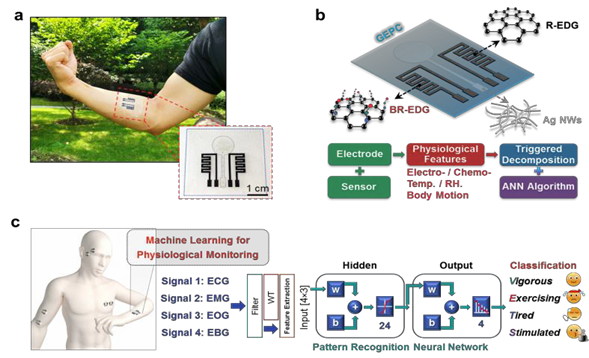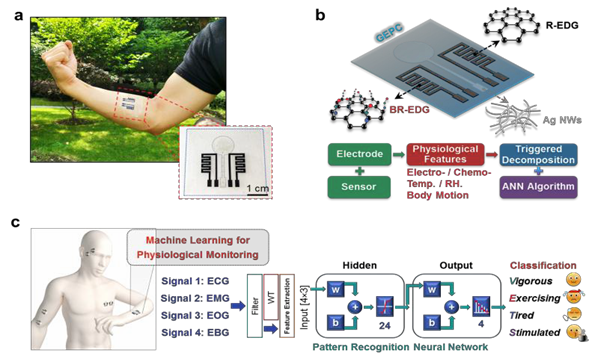“Skin-friendly” Epidermal Electronics – A Step Closer to Wearable Diagnostic “Labs” for Human Physiological Monitoring and Intelligent Identification
Date:10-01-2020 | 【Print】 【close】
“Skin-friendly” Epidermal Electronics – A Step Closer to Wearable Diagnostic “Labs” for Human Physiological Monitoring and Intelligent Identification
Epidermal Electronic, as an electronic sensing system directly attached to the human skin surface, is being widely studied and applied to real-time multi-dimensional acquisition of the physiological state of human body. However, most skin electronics currently lack sufficient biocompatibility, and face the dilemma of being firmly attached during use and easy to take off when not used. In addition, the electronic system is difficult to perform customizable multi-dimensional physical and chemical parameters sensing. Moreover, the big data obtained from the measurement lacks effective analysis methods. Problems such as the generation of harmful electronic waste after use have severely limited the development and practical application of skin electronics.
Here, Tiger H. Tao and his team of researchers have proposed a human-friendly skin electronic system based on biological protein materials, which can be firmly attached to the surface of human skin during use, measuring human electrical signals and various physiological and chemical secretions. After usage, you can trigger a fast and controllable separation to achieve multi-dimensional real-time measurement without skin damage. In addition, in response to the measured multi-modal big data, the researchers developed a machine learning algorithm based on artificial neural network, which can accurately distinguish the various physiological states of the human body, and provide an effective solution for human body's all-weather health monitoring.
The above research results were published in an internationally renowned journal Advanced Materials with an impact factor of 25.809. After the research was published, it was widely appreciated by scholars and companies in the field, reported by the Advanced Science News website, and pointed out: " Tiger H. Tao's team combines skin electronics with machine learning, which will be crucial for the future of personalized intelligent medicine".

Figure 1: Preparation of "skin-friendly" electronics based on flexible biocompatible protein materials, combined with artificial intelligence neural network algorithms, to achieve accurate identification and all-weather monitoring of the multidimensional physiological state of the human body, solving the lack of good biocompatibility and difficulties in intelligent multidimensional analysis. Related results were published on Advanced Materials and reported by Advanced Science News's homepage highlight.

Figure 2: Photo demonstration of the "skin-friendly" electronic device (the skin electronic is attached to the human arm). The research results were reported by the Advanced Science News website homepage highlight.

Figure 3: (a) Schematic of the application scene; (b) Schematic diagram of the composition of intelligent electronic skin: skin electrodes based on silver nanowire network, self-calibrated biochemical sensor based on modified graphene; (c) In response to the measured multi-modal big data, the researchers developed a machine learning algorithm based on artificial neural network, which can accurately distinguish the various physiological states of the human body, and provide an effective solution for human body's all-weather health monitoring.
